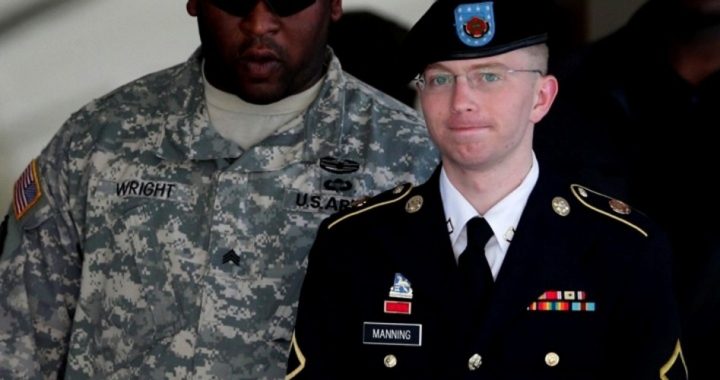
On January 8, a military judge ruled that Army PFC Bradley Manning was mistreated by the Army while in detention in military prisons.
Colonel Denise Lind, the judge presiding at Manning’s court martial, found that the young man, accused of passing a massive amount of sensitive documents to Wikileaks, was subject to extremely harsh conditions and thus made a corresponding reduction in any sentence Manning may eventually receive.
The Guardian’s Ed Pilkington reports that Lind “granted him [Manning] the dispensation as a form of recompense for the unduly long period in which he was held on suicide watch and prevention of injury status while at the brig at Quantico marine base in Virginia where he was detained from 29 July 2010 to 20 April 2011.
Private Manning, 24, from Crescent, Oklahoma, has been detained since he was arrested on May 29, 2010 while on deployment with the 10th Mountain Division in Iraq. While on duty near Baghdad, Manning had access to the Secret Internet Protocol Router Network (SIPRNet) and the Joint Worldwide Intelligence Communications System. SIPRNET is the network used by the U.S. government to transmit classified information.
Manning’s arrest came as the result of information provided to the FBI by a computer hacker named Adrian Lamo. Lamo told agents that during an online chat in May 2010, Manning claimed to have downloaded classified information from SIPRNet and sent it to WikiLeaks.
According to published reports, the material Manning is accused of unlawfully appropriating includes a large cache of U.S. diplomatic cables (approximately 250,000), as well as videos of an American airstrike on Baghdad conducted in July 2007 and a similar attack in May 2009 on a site near Granai, Afghanistan (an event sometimes known as the Granai Massacre).
On July 27, 2012, the defense counsel representing Manning filed a motion to dismiss “owing to the unlawful pretrial punishment to which PFC Manning was subjected while at Marine Corps Base, Quantico [Virginia].” Another motion was filed requesting a continuance of the proceedings owing to the slow production by the government of reams of documents that are “obviously material to the preparation of the defense.”
David Coombs is Manning’s civilian lawyer and in a blog post he declared that the contents of the Article 13 motion (the motion to dismiss) would “shock the conscience of the court.” Coombs’ confidence was well founded as the tale related by him in the motion is disturbing and shines an unfavorable light on high-ranking American military officials.
One such revelation concerns a three-star Army general that allegedly ordered the brutal treatment of Manning while he was detained at the brig in Quantico. Coombs claims that e-mails he has obtained demonstrate that two separate brig commanders carried out the general’s orders in “clear violation of Article 13 of the Uniform Code of Military Justice (UCMJ).
In relevant part, Article 13 reads:
No person, while being held for trial, may be subjected to punishment or penalty other than arrest or confinement upon the charges pending against him, nor shall the arrest or confinement imposed upon him be any more rigorous than the circumstances required to insure his presence, but he may be subjected to minor punishment during that period for infractions of discipline.
As portrayed by Coombs, the treatment to which PFC Manning was subjected clearly violates the prohibition against confinement “any more rigorous than the circumstances required.”
Lind’s decision in the case was based on Article 13.
While certainly a victory for Manning and his legal team, it has a far cry short of the dismissal Coombs and company sought in their July 27 motion.
Last summer, Coombs insisted that e-mails disclosed by the Army “reveal that everyone at Quantico was complicit in the unlawful pretrial punishment, from senior officers to enlisted soldier.” Attorneys representing the government withheld these e-mails from Manning’s defense team for six months, an inexcusable deprivation of the accused’s due process rights as guaranteed by the Constitution and the UCMJ.
Dismissal of the 22 counts against Manning is a possibility under Article 13, but Judge Lind found that the account of Manning’s unconscionable mistreatment at the hands of the U.S. military did not rise to a level meriting that outcome.
“The charges are serious in this case and there was no intent to punish. There is no argument to dismiss the charges,” the judge said.
No intent to punish?
Consider the fact that during his imprisonment, PFC Manning was held in a 6×8 cell in what is known as MAX Custody, a condition Coombs describes as “the functional equivalent of solitary confinement.” Manning was kept in this state for more than 23 hours a day, being allowed only 20 minutes respite a day during which he was to exercise. Such activity was nearly impossible, however, as his hands and feet remained shackled during this time.
Additionally, as part of his MAX Custody and Prevention of Injury (POI) classification, Manning was forbidden from lying down on his rack during the day and he could not lean against the wall. He was ordered to sit upright on the rack without back support all day. And, during the hours of 5 a.m. to 10 p.m., Manning was required to stay awake.
When confronted about the inhuman conditions under which Manning was being detained, military officials maintained that he was being treated in this manner as means of preventing injury. This despite repeated psychiatric evaluations declaring such treatment unnecessary. In fact, the psychiatrists who evaluated Manning repeatedly informed Quantico Brig officials that PFC Manning’s POI status was unwarranted as the accused posed no risk of harming himself and that in fact the prolonged POI status was causing PFC Manning psychological harm. As Coombs reports, “The psychiatrists’ recommendations were outright ignored by Quantico officials.”
Judge Lind was not convinced and in her ruling she went only so far toward recompensing Manning for his abuse at the hands of his accusers.
She agreed, in the end, to a day-for-day accounting of the reduction of the potential length of any imprisonment to which Manning might be sentenced if found guilty.
The details of the judge’s ruling was described by Pilkington:
Specifically, she granted Manning seven days off any sentence for the seven days when he was kept on the most restrictive regime, known as Suicide Risk, against the advice of psychiatrists — the only Article 13 violation accepted by the prosecution; 75 days off sentence for when he was kept on the only slightly less onerous status of “prevention of injury”, also against professional opinion; 20 days for having his underwear removed unduly after he made a joke that he could use that to harm himself; and 10 days for being granted just 20 minutes of recreation outside his cell every day when he should have been given a full hour.
How can the commander-in-chief of the armed forces — himself a Nobel Peace Prize winner — tolerate such barbaric behavior by those trusted with guarding military prisoners?
Not that President Obama hasn’t commented on the situation:
“With respect to Private Manning, I have actually asked the Pentagon whether or not the procedures that have been taken in terms of his confinement are appropriate and are meeting our basic standards. They assure me that they are,” President Obama said during a White House press conference on March 10, 2011.
Despite Judge Lind’s recognition of the reprehensible manner in which Manning was treated while in military custody, the government is undeterred in its quest to punish the private.
As reported by the New York Times: “Military prosecutors preparing to try Pfc. Bradley Manning said on Wednesday that they would introduce evidence that Osama bin Laden requested and received from a Qaeda member some of the State Department cables and military reports that Private Manning is accused of passing to WikiLeaks.”
Following the government’s statement on Wednesday, Judge Lind declared that Manning’s court martial will be postponed until June 3 to provide herself, the government, and the lawyers the opportunity to digest the additional material to be presented and to exclude any classified information.
Once the trial begins, it is expected to last at least 6 weeks.
Bradley Manning has now been imprisoned for nearly 1,000 days without trial.
Photo of Army Pfc. Bradley Manning being escorted out of a courthouse in June 2012: AP Images
Joe A. Wolverton, II, J.D. is a correspondent for The New American and travels frequently nationwide speaking on topics of nullification, the NDAA, and the surveillance state. He can be reached at [email protected].



